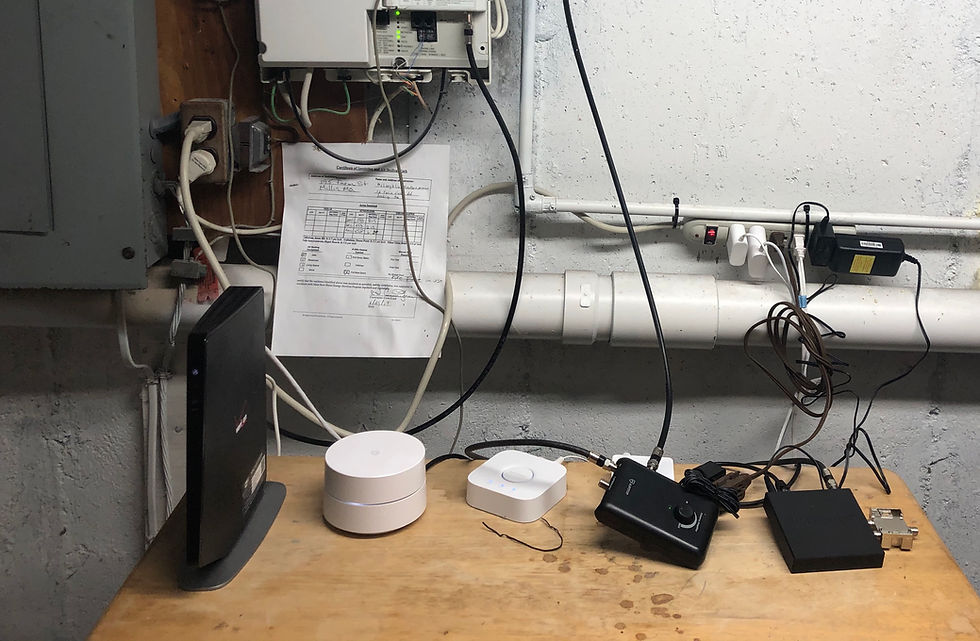What do you mean "Cut the Cord"?
- Eli Jacobson
- Feb 15, 2020
- 4 min read
If there is one thing we can all pretty much agree on these days, in spite of all of the political polarization and conflicting views of which direction to install the toilet paper roll, we all think we are paying too much to our Internet/TV providers....unless you're not paying them at all.
Whether you have Comcast, Verizon or another provider, I'm willing to bet that your bill is higher than you think it should be and you have experienced significant rate increases that made you feel like calling them up to cancel the service entirely....right? You probably signed up with some promotional, sweetheart of a deal, but that has long expired and now your monthly bill blows your mind every time you have to pay it.
The problem is that TV and internet are services we pretty much can't live without these days. I'd argue that internet is the most crucial service, and there may only be one single TV channel we need....but that ONE channel is still crucial. By design, the service providers and networks have arranged to make it impossible to subscribe to that one channel you need, forcing you to pay for a massive package of channels, most of which you could care less about.
In our ongoing pursuit of decreasing that monthly bill, we continue to hear this term "cut the cord" as more providers enter the market promising to lower the cost of delivering your content. Most commonly, you will hear it from internet-based TV providers who are trying to sell you a TV package that streams the content via the internet. The term may also come up during ads for on-demand content services such as Netflix and Hulu. Perhaps you have heard about the option of installing an antenna in or on your house and getting channels over-the-air, but are not clear about how this actually works or what channels you will actually receive.
The term "cut the cord" keeps getting thrown around relatively loosely and has become a key term for marketing many different services and products that will supposedly save you money, but I'm afraid it is also causing some confusion.
My interpretation of the "spirit" of term "the cord" is that "the cord" provides us with TV. It does not matter if there is a physical cord connecting our devices. "The cord" is a service. Back in the day, it was definitely a physical cord that came into your house and provided you with premium TV channels and nothing else. Now, some services (such as Comcast) may use that same (coaxial) cable to provide all of your services (TV, Internet and phone) while others (such as Verizon) have run a different cable to your house based on a different technology (most likely fiberoptic cable). Other services (such as DirecTV) connect the content to your house via satellite or the new Starry internet service connects via a broadcasted wireless signal, similar to cellular networks. My point is that the physical "cord" is no longer relevant to the term, as there may not be a cord to cut....but you are still paying more than you would like for these services.
I'll cut to the chase.....in my opinion, "cutting the cord" means that you are eliminating your paid TV subscription entirely. If you switch from one service to another, you have not actually cut the cord. If you eliminate your cable TV subscription from Comcast, but are now paying YouTube TV for the content, you also have NOT truly cut the cord. You may have decreased your bill, and that may be all you needed to do, which is great, but it does not qualify as fully cutting the cord.
The only way to truly cut the cord and still get live TV is with an over-the-air antenna because you are not paying anyone a subscription fee for the content. If you are within range and have decent reception and a good antenna, you can get about 60 channels....many of them in glorious 1080p HD. I'd argue that the picture can actually look even clearer than what I was getting from Verizon or Comcast. If all you need is your major networks (ABC, CBS, FOX, NBC), then this could be a great, money-saving solution.
Going this route means that you likely lost at least one channel you really liked. No more ESPN or local sports cable network (NESN around here). No more cooking channel (I do miss that channel). No more Hallmark movie channel at Christmas time. Also...no more bill.
The reason you pay all that money to Comcast or Verizon for TV is really for convenience. You just want to turn on your TV and watch what you want without any hassle. You don't want to screw around with an internet-based TV service that will make you log into apps on your SMART TV or worry about the channel lineup and possibly lose one of your key channels. You don't want to have to figure out a complicated way to get the baseball game on. You just want it to work. Well...that is where they got you.
I actually happen to enjoy tinkering with the different services and technologies, learning different ways to obtain the content and save a few bucks while i'm doing it. Part of it is research so I can help other folks come up with solutions. When someone asks me about solutions for "cutting the cord", I can't lie to them and tell them there is a magical way to save money without any caveats. You can definitely save money if you are willing to either forfeit some of the content and/or some of the ease of using your traditional cable TV system, but it isn't for everyone. I would still encourage everyone to think about the options and make that determination themselves.




Comments